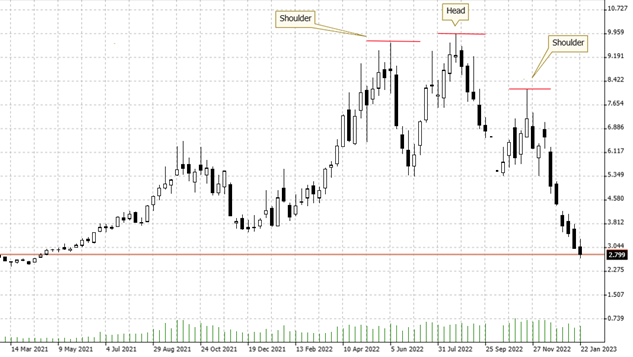

01.02.2023 – The price of natural gas has plummeted. And that despite the Ukraine war and the winter season. We analyze the reasons for this.
Undeterred, the gold price continues its recent march upwards – here the daily chart. No wonder: Just in time for the week of the central banks – the market expects a wave of interest rate hikes by the Federal Reserve, European Central Bank and co. – bullish news has crossed the ticker.

Source: Bernstein Bank Ltd.
The world’s central banks bought more gold in 2022 than they have since 1967. But why – if interest rates rise everywhere would be poison for precious metal. Because gold does not yield interest and costs money for storage in the bank. We see a possible cause: Perhaps the monetary guardians expect an inflation that cannot be stopped even by interest rate hikes. Or a deflationary crash, in which case gold would be a safe haven. The World Gold Council (WGC) has come up with a different explanation, in a more covert way: One of the main arguments for the monetary guardians is the lack of “counterparty risk” with gold – that is, the control of a foreign currency by another central bank. In other words: devaluation through money printing. And also capital controls and freezing of assets in the course of the Western sanctions against Russia.
Monetary guardians rely on gold
As for the details: total global demand rose to 4,741 tons last year, according to the lobby group – the highest level since 2011. Central banks in particular stocked up. In the last quarter of 2022 alone, there were 417 tons – about twelve times as much as in the same quarter of the previous year. Overall, annual purchases of 1,136 tons were more than twice as high as in the previous year.
According to the WGC, central banks have thus been net buyers since 2010 – after two decades on the sell side. Incidentally, only about a quarter of all central bank purchases were reported to the WGC. Turkey led the way last year with almost 400 tons. China reported 62 tons in November and December. The Financial Times, citing unnamed analysts, suspects that the rest was acquired mainly by central banks, pension funds and government agencies in China, Russia and the Middle East.
UBS sees $2,100
For retail investors, demand jumped to more than 1,200 tons in 2022, a nine-year high. Here, inflation concerns have provided the incentive to buy. The investment bank UBS has reacted and just raised the price target for the end of the year from 1,850 to 2,100 dollars per troy ounce. Which would be a new all-time high – the previous one was marked at $2,069 in the summer of 2020. We are curious how the matter continues – and wish successful trades and investments!
__________________________________________________________________________________________
The content of this publication is for general information purposes only. In this context, it is neither an individual investment recommendation or advice nor an offer to purchase or sell securities or other financial products. The content in question and all the information contained therein do not in any way replace individual investor- or investment-oriented advice. No reliable forecast or indication for the future is possible with respect to any presentation or information on the present or past performance of the relevant underlying assets. All information and data presented in this publication are based on reliable sources. However, Bernstein Bank does not guarantee that the information and data contained in this publication is up-to-date, correct and complete. Securities traded on the financial markets are subject to price fluctuations. A contract for difference (CFD) is also a financial instrument with leverage effect. Against this backdrop, CFD trading involves a high risk up to the point of total loss and may not be suitable for all investors. Therefore, make sure that you have fully understood all the correlating risks. If necessary, ask for independent advice. CFDs are complex instruments and are associated with the high risk of losing money quickly because of the leverage effect. 68% of retail investor accounts lose money trading CFD with this provider. You should consider whether you understand how CFD work and whether you can afford to take the high risk of losing your money.7
